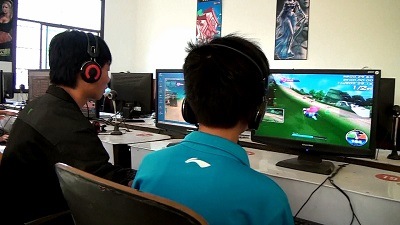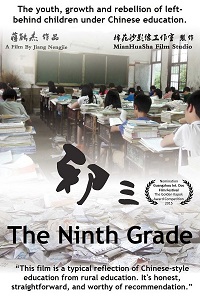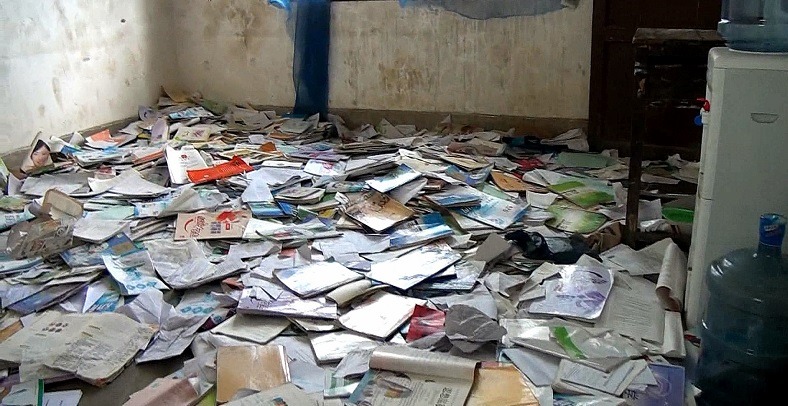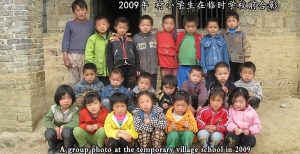Last Updated on January 15, 2021
Left-behind children will face their first choice in life. Will they continue to study, or will they work early like their parents and raise another generation of left-behind children?
Dian Ying Jing Tou Se Diao
We translate local audiences’ reviews about issues presented in the film into English when possible. In this way, you can take a look at what local people think about these issues and have in-depth understanding about them. The number besides the reviewer represents how many upvotes a comment/review has received.
Warning: spoilers may apply. To ensure the best viewing experience, we suggest that you watch The Ninth Grade first and subscribe now for 20% OFF.
Short Comments
The children’s learning shown in The Ninth Grade is not so different from that of me who grew up in the city. Almost all teachers destroy the beauty of the content they teach, especially in language courses. Before watching this film, I was also paying attention to the group of left-behind children and corresponding with one of them. The unexpected information from this documentary is that some left-behind children have no feelings for their parents, or even have unrecognized situations.
-Guo (6)
I’ve seen it several times. The first time I saw it, I didn’t have very deep feelings. However, after I understood the current educational and living environment, I felt powerless when I saw it the second time. The education in the countryside has blinded us to hope.
-Ben Pao (6)
This is really a documentary, and many scenes remind me of my life in high school. The shots are rough, but they are also the most authentic records. The subject is worthy of a larger and more detailed treatment. Chinese traditional education is always a problem that needs deep attention!
-Ri Yue Can Shang (1)
The film is very objective and realistic. This middle school also represents many of them in China. I lament for China’s education but at least there’s someone to record these happy and sad valuable past.
-Guo Lei
What a real documentary. We should pay more attention to the study situation of the ordinary families in the rural areas. Many people just film the freshness of those cities. Are they afraid other people don’t know about our development? Without enough attention to these people in rural areas, the problem will never be solved. Heartfelt tribute to the director for his efforts.
-Komi
The new generation of left-behind children who grow barbarically have much richer entertainment and more temptation. The teachers who get along with them day and night take the place of the absent parents to some extent.
-A Xiao Gu

The documentary has the texture of a touch of memory. In addition, it reflects the sadness of class solidification and urbanization.
-Hong Shan Qu Liang Chao Wei
The youth of others? I once spoke with a classmate who had the same accent as in the film and is now studying abroad. I said that there are actually quite a few students in China who are still like the characters in the film. He didn’t believe me and said that I read too much history. China was only like this 30 years ago.
-Hai Shang Pu Ming
Compared with the twelfth-degree students who have passed a round of screening, ninth-three is obviously more painful. It is during this period that many people’s lives begin to diverge. There are plenty of people working in cities before 18.
-Pang Guan Zhao
The hardest part is that the children think that the adults don’t love them. We always say love, but in fact, if the other party cannot receive it, that love is lost. The separation of left-behind children from their parents will eventually make it difficult to establish intimate relationships, which will have a lifelong impact on children. I feel so distressed after watching it.
-Jia Bu De Su Ke Lei
The deepest impression: first-class schools focus on teaching, and second-class schools focus on discipline. Teachers and facilities are important in rural schools.
-Ye Man Sheng Zhang
Everyone’s life starting point is different, and the social division of labor is also different. There must be more than half of people that can only work outside of hometown to maintain the operation of society. I’m already luckier than most people. One of the great meanings of documentaries is to preserve archives for the society.
-Guo Jian Yu
No one really cares about these rural youths’ future. Youthhood is not only ignorant but also numb in their place…
-At
There is a sense of authenticity in returning to the past when you put your own experience back into the lens. It’s 2014, but the documentary still shows scenes from my memory. Since childhood, we have been living in a collective and being taught, and struggling is the most common reality. Thanks to director Jiang for preserving the inscription of reality for Chinese education. It’s about graduation and about the fact that the catharsis of emotion becomes the helpless feedback of examination system.
-Tian Liang
After watching it, I found out how “let them eat cake” I am.
-sky
Because it is Hunan, it has a lot in common with my hometown. However, the selected places are too typical, which are left-behind children’s poverty-stricken areas, and many phenomena such as paying little attention to education will appear. In fact, many places in China have long been free of such a situation. Too typical is not good.
-Du Hai Shi Nian Gui

Deep sense of powerlessness. If I graduate, I may really go to volunteer teaching. However, these children are in an environment that already allows them to play cards, drink alcohol, and have no culture. How much can a single person do? Men are not created equal.
-Leng Yue Wu Sheng
Environment and family are really important in shaping a person. Most of their parents go out to work and have no time to take care of their children’s growth. Rural middle schools are also under pressure to enroll, and some parents may not be able to afford the tuition fees to keep their children in school. It seems that only by going to a good school and leaving the countryside can you have a better development. They are a microcosm of China’s left-behind children and a testament to the imbalance between urban and rural development.
-Dimple Ran
I saw the real nine-year compulsory education in China. The failure of education has destroyed many people!
-Qian Li Li
Left-behind children will face their first choice in life. Will they continue to study, or will they work early like their parents and raise another generation of left-behind children?
-Dian Ying Jing Tou Se Diao
This documentary is a record of the ninth grade, but also a feedback to the rural left-behind problem. Study mechanically just because you have to, but who will soothe the growth of the mind? Finally, even the teacher said that studying is useless. Worth or not worth? It’s worth pondering!
-Yuan
Thinking and reflection, rural and urban, the teacher’s different teaching methods, all these let me now as a normal student, be strongly dissatisfied with the slow Chinese education. Not long ago I saw Finland abolish the division of education, just in time to catch up with the pace of the 21st century. So when will China break through?
-Jiong Mu 90 Hou
It reflects that left-behind children are a group of vulnerable groups in the society. They leave their parents to live alone, missing home but cannot go back, missing parents but parents are not around. Society needs to give them more care. Pay attention to left-behind children, starting from we youth.
-2015, Dai Ni Qu Lu Xing
Some people suggest that everyone should go back to his hometown to set up a library, which may help the lack of education for left-behind children in rural areas. But how many people will go back to their hometown to open a library? We came out from our hometown with the idea of “going out and not going back”. Now many people feel at loss and think the strength is small when doing public welfare. And director Jiang chose to go back to pay attention to this group of left-behind children, which is commendable.
-Xiao Shi Tou
I once worked as an intern in a rural middle school in Hunan province for half a year. It feels exactly like the life in the movie. However, in this kind of atmosphere, progressing is very difficult. I admire the rural educators very much, but myself, after the experience, never want to go back to that environment.
-No
The problems we face go far beyond left-behind children and exam-oriented education. But what exactly should we do and what attitude should we have?
-Zhou Zhou
Source: Douban
The Power of Recognition
There are always a few people who don’t take study seriously. In fact, I think there are other ways for them to go, provided that they find their own advantages. Even if you don’t study, you should have the capital to succeed. But even if they do, in that environment, will someone find out, and will there be an opportunity to develop? The problem is obvious.
Education has gone into a blind spot, using grades to judge a person. Those who get bad grades will have low status. So from another point of view, this will cause a kind of harm to their psychology, causing even less upward motivation. Schools like to set up the key class and the regular class. I think this way does not generate the great benefit to the contemporary education. People and people are equal, but the rigid separation of a space makes the excellent people complacent and the general people decadent unceasingly!
When we praise the high score, should we also give the average person positive expressions? In this way, even if they don’t get the results they want, they will become better because of everyone’s recognition of them!
Wu Yi Xiang, Douban reviewer (3)
The Problem of Exam-Oriented Education
Why should the results of the poor to be divided into a class, and good grades to be divided into another class? Is this good for the children? Why do we use grades to row seats? Its purpose may be to motivate students to study hard. However, after stepping into the society, what you have to face is actually often people at all levels. Although the solidification of the stratum is becoming more and more serious, is it not a bad phenomenon?
A lot of people are already talking about education. However, exam-oriented education still exists. The examination, is the measure student ability ruler. This is actually different. It is ok for high schools, but it’s totally different for colleges. The teacher doesn’t care about your grades, it’s about your ability. Ability is reflected in the quality of being a person, communication and cooperation ability, learning ability, and attitude. Therefore, excellent children born under the exam-oriented education are not what this society needs.
Dai Mei Yun, Douban reviewer (1)
The Deficiency and Reality of Education System
Many people see the shortcomings of the educational system in this film. For these children, studying is all about grades, getting into good schools and living up to the expectations of their families. This kind of learning task, with no fun and only pressure, is undoubtedly a great test of willpower for every young child. In order to make them concentrate on their studies and keep themselves in good physical and mental condition, the school teachers constantly put pressure on them.
After the movie, one viewer suggested that in the age of the Internet, which encourages diversity, these kids might be able to break out of the score-only trap. The director said, this may be bad for them, because they don’t have any special skills. I think the answer is very down to earth. There is no denying that human potential is unlimited, but the channels to tap the potential are very limited. You can’t expect a lot of little inventors, musicians, explorers and so on to pop up in a place where you’re just getting enough to eat and drink, because their access to things is so limited. Although the Internet has greatly facilitated the exchange of information, it is also very difficult to expand one’s horizons and reach out to possibilities not discussed by those around one.




